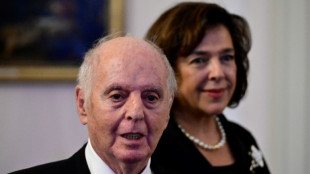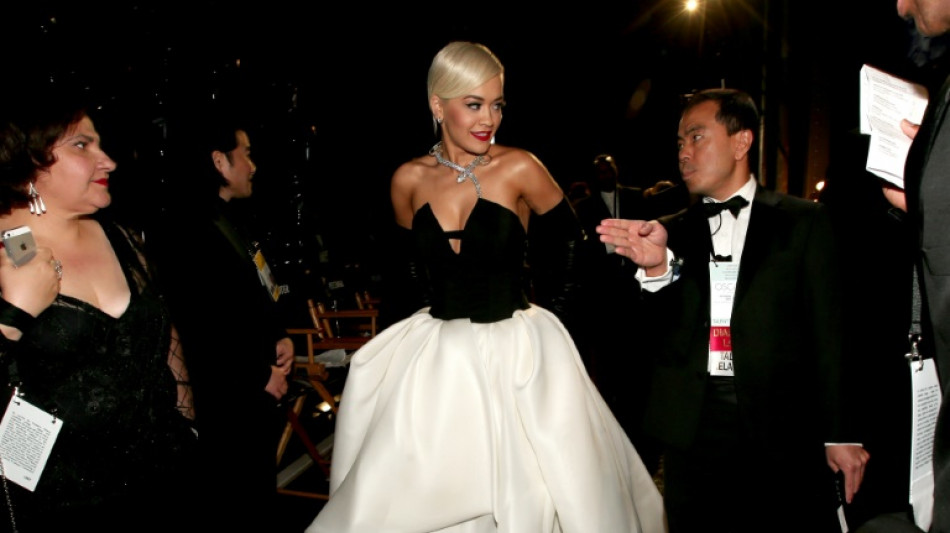
-
 Trump's Gaza plan derails Saudi-Israel ties: analysts
Trump's Gaza plan derails Saudi-Israel ties: analysts
-
Easterby makes two changes for 'significant challenge' of Scotland

-
 Third Al-Fayed brother accused of sexual abuse: BBC
Third Al-Fayed brother accused of sexual abuse: BBC
-
AI starts to help India's struggling farms

-
 Australia 85-2 after Sri Lanka strike early in second Test
Australia 85-2 after Sri Lanka strike early in second Test
-
Asian markets mixed ahead of key US jobs data

-
 Five facts about Kosovo: three flags, pop royalty and love of US
Five facts about Kosovo: three flags, pop royalty and love of US
-
James's 42 points lead Lakers over Warriors, Mavs top Celtics in NBA Finals rematch

-
 Mendis stranded on 85 as Australia bowl Sri Lanka out for 257
Mendis stranded on 85 as Australia bowl Sri Lanka out for 257
-
'Trump' thrills fans at Hong Kong theatre's last hurrah
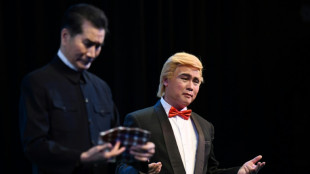
-
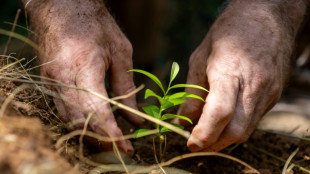 Hong Kong scientists fight to save fragrant incense trees
Hong Kong scientists fight to save fragrant incense trees
-
Mavericks top Celtics in NBA Finals rematch

-
 Bills' Allen wins NFL Most Valuable Player award
Bills' Allen wins NFL Most Valuable Player award
-
Taiwan says detects six Chinese balloons near island

-
 Tokyo world athletics party can make up for Olympic lock-out, says CEO
Tokyo world athletics party can make up for Olympic lock-out, says CEO
-
'Lottery ticket': Crypto investors brace for bumpy ride under Trump

-
 Most Asian markets rise ahead of key US jobs data
Most Asian markets rise ahead of key US jobs data
-
'Social Network' star Eisenberg slams Zuckerberg as 'obsessed with power'

-
 How to stop Barkley? Chiefs know they face ultimate test
How to stop Barkley? Chiefs know they face ultimate test
-
Baghdad's first skatepark offers boarders rare respite

-
 Convicted murderer executed in Alabama using nitrogen gas
Convicted murderer executed in Alabama using nitrogen gas
-
Trump, Swift join Super Bowl party as Chiefs chase 'three-peat'

-
 Barkley picks global lineup for NBA All-Star tournament
Barkley picks global lineup for NBA All-Star tournament
-
Big Tech's AI spending rattles markets

-
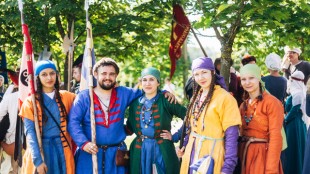 Agronomics Limited Announces Meatly Launches First Cultivated Meat Dog Treat
Agronomics Limited Announces Meatly Launches First Cultivated Meat Dog Treat
-
Ohtani's ex-interpreter sentenced to nearly five years in betting-linked theft

-
 Madsen, Kupcho share lead at LPGA Founders Cup
Madsen, Kupcho share lead at LPGA Founders Cup
-
Rashford doesn't see football 'way I see it', says Amorim

-
 Kenya deploys additional 144 police to Haiti
Kenya deploys additional 144 police to Haiti
-
Liverpool 'too good' for sorry Spurs, says Postecoglou

-
 Trump trade nominee says universal tariffs worth considering
Trump trade nominee says universal tariffs worth considering
-
Trump sanctions ICC for 'illegitimate' Israel, US probes

-
 Torres treble powers Barca past Valencia into Copa del Rey semis
Torres treble powers Barca past Valencia into Copa del Rey semis
-
Judge pauses Musk plan for mass cull of US govt workers

-
 Liverpool thrash Spurs to reach League Cup final
Liverpool thrash Spurs to reach League Cup final
-
Fiorentina honour Bove by sweeping aside Inter Milan

-
 Rubio renews US hard line with Venezuela plane seizure
Rubio renews US hard line with Venezuela plane seizure
-
Amazon profits double, but cautious outlook disappoints

-
 Trump trade nominee floats universal tariffs
Trump trade nominee floats universal tariffs
-
Fighting global warming in nations' self-interest: UN climate chief
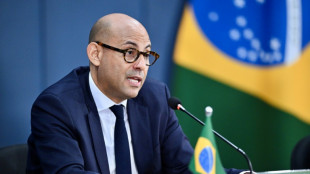
-
 British 'Netflix' conman gets six-year prison term in France
British 'Netflix' conman gets six-year prison term in France
-
It's all business for Eagles quarterback Hurts at Super Bowl

-
 Cavs add Hunter, Nurkic to Hornets at NBA trade deadline
Cavs add Hunter, Nurkic to Hornets at NBA trade deadline
-
Alcaraz cruises, Tsitsipas scrapes through in Rotterdam

-
 Judge pauses Musk plan for mass US govt cull
Judge pauses Musk plan for mass US govt cull
-
Monahan, Scott implore Trump to help finalize PGA-LIV deal

-
 Swindling Brit stands trial for injuring French police in getaway
Swindling Brit stands trial for injuring French police in getaway
-
Cavs add Hunter, Nurkic to Hornets as NBA trade deadline nears

-
 Scientists claim to have cracked how to cook the perfect egg
Scientists claim to have cracked how to cook the perfect egg
-
PSG's crushing domination leaves no hope for domestic rivals


Five facts about Kosovo: three flags, pop royalty and love of US
Kosovo, one of Europe's poorest countries beset with rocky relations with its larger neighbour Serbia, holds parliamentary elections Sunday.
Here are five things to know about the former Serbian province, which broke away from Belgrade in a bloody war in the 1990s and is still pushing for full global recognition of its statehood.
- America the great -
Kosovo's reputation as "the most pro-American country" in the world continues to be visible on the streets.
The love for all things American is rooted in gratitude for Washington's support during Kosovo's struggle for independence from Serbia, including the US-led NATO intervention that ended the war in 1999.
The capital Pristina is home to a statue of former US president Bill Clinton, a bust of former US secretary of state Madeleine Albright and a boulevard named after George W. Bush.
Klinton and Medllin -- a Kosovar twist on Clinton and Madeleine -- are also popular names for children born after the conflict.
With popularity also comes influence.
Washington wields heavy clout in Pristina, leading to the joke that Kosovo has two governments: one that is elected and another in the super-modern US embassy, perched on a hill overlooking Pristina.
- Pop stars and diaspora -
Kosovo is home to around 1.6 million people, with another 800,000 estimated to be living abroad, mostly in Germany and Switzerland.
The diaspora is a hefty economic force, sending home millions of euros in vital remittances annually, while also spending an untold amount of cash during summer holidays.
Kosovo is also home to one of Europe's youngest populations, with half aged under 25.
However, it has one of the highest youth unemployment rates, which together with the poverty level of just above 19 percent, is a major factor in pushing people to emigrate.
Some of Kosovo's most famous ambassadors are its diaspora pop stars, including the UK-raised Dua Lipa and Rita Ora, who both speak proudly of their Kosovo roots and do not miss a chance to promote its independence.
- Three flags -
Three different flags can be found flying across Kosovo.
The official flag bears the diamond shape of its territory and six stars symbolising the six main ethnic groups on a blue background.
It is jokingly called a "towel" by members of Kosovo's ethnic Albanian majority, who believe the flag was adopted largely to please Western patrons who wanted a neutral symbol.
But the colours more commonly flown across Kosovo are the pan-Albanian symbol of a black double-headed eagle on a red background, which is also the official flag of neighbouring Albania.
The exception is in enclaves home to Kosovo's Serb minority, who still fly the Serbian tricolour flag as a symbol of their loyalty to Belgrade.
- Recognition -
Kosovo declared independence in 2008 -- a decision that was recognised by more than 100 nations, according to its foreign ministry.
Serbia, however, has fiercely refused to recognise the young democracy and with help of Russia and China has lobbied heavily against its international recognition and played a pivotal role in helping block its UN membership.
In 2017, Belgrade launched a "derecognition campaign" aiming to persuade countries that have recognised Kosovo to reverse that decision.
Serbia said it has succeeded in convincing some 28 countries to revoke their recognition of Kosovo to date.
However, the "derecognition campaign" is not without controversy.
Kosovo authorities have accused Serbia of spreading disinformation, saying that they had not received a single official communique from any of the countries Serbia has alleged no longer recognises the government in Pristina.
- Moderate Islam -
More than 90 percent of Kosovars identify as Muslim, making it one of Europe's few Muslim-majority territories.
Most followers of the faith in Kosovo practise a liberal form of Sunni Islam.
Research shows that for many, religion is a private matter and ethnicity takes precedence.
"The religion of the Albanians is Albanianism," goes one common saying in the Balkans.
But recent years have seen growing pockets of extremism, leading authorities to crack down on a handful of radical clerics.
F.Ramirez--AT

